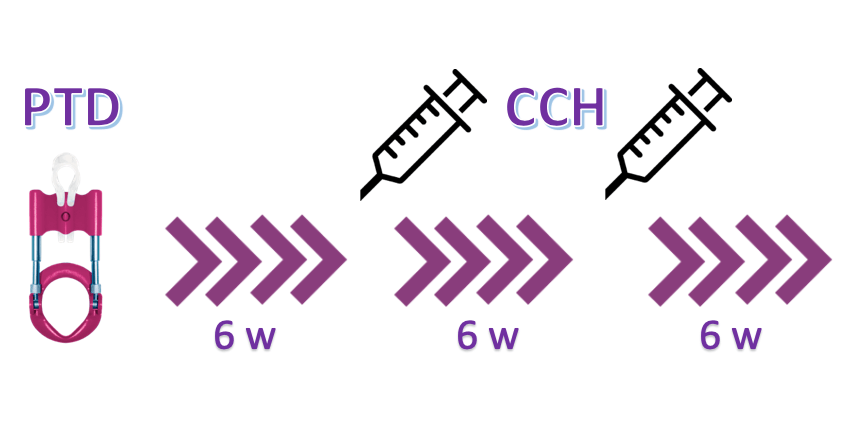In the last 5 years different treatments have been proposed for Peyronie’s disease. The American Urological Association (AUA) and the Canadian Urological Association (CUA) have proposed a medical protocol based on binding collagenase injections together with daily use of the penile traction device. Now a new scientific study better adjusts the amounts of collagenase and how to use penile traction. This study was published in The Journal of Sexual Medicine in May 2019, based on the work of the urology departments of 2 hospitals of the University of Madrid-Spain. The title of this study is: The penile traction device reduces the number of collagenase cycles in Peyronie’s disease.
The method used to conduct the clinical study was based on collecting 63 patients diagnosed with Peyronie’s disease and treating them with a combination of both therapies, collagenase and penile traction device. The criteria for including patients were being over 18 years of age, having a curvature of more than 30º, having a fibrosis plaque that was palpable and that affected the sexual life of the patients. Doctors collected all the data, such as IIEF-5, PDQ indices, the time since they had symptoms, and the Kelami test on penile curvature.
During the clinical study, patients received a maximum of 4 cycles of treatment, each cycle based on 2 injections of collagenase in 24-72 hours, followed by use of the penile traction device for 6 weeks. The daily use of the device was a minimum of 4 hours a day.
The results obtained by the 63 patients were very clarifying to establish a new medical protocol. Of all the patients, 4 did not follow the study, but 59 did. 59 patients received 1 cycle of treatment, 41 received 2 cycles of treatment, 15 received 3 cycles and 4 received 4 cycles. At the end of treatment, the mean curvature was 36º, with a reduction of -24º (-40%). The average number of cycles was 2.
The conclusion of this scientific study was that the combination of collagenase together with the penile traction device manages to reduce the number of collagenase cycles and obtains results similar to other clinical studies, achieving an improvement in the cost of treatment.
Link: https://www.jsm.jsexmed.org/article/S1743-6095(19)30622-8/abstract


Price from $99 / €99 / 89£ / 149 AU$-CA$. Free Shipping
